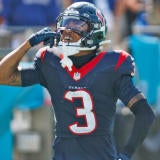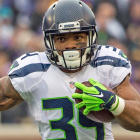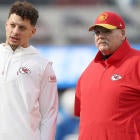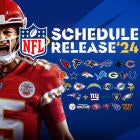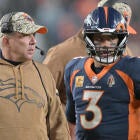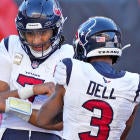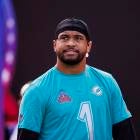In their opening-round playoff game against the Lions, the Seattle Seahawks won the time of possession battle handily. The Seahawks handed the ball off to Thomas Rawls 27 times last Saturday evening and Rawls rewarded their faith by gaining 161 yards on the ground.
Those 161 yards were the biggest factor in Seattle's controlling the ball for 36 minutes and 39 seconds of the game's 60-minute running time.
When they square off against the Atlanta Falcons this Saturday, the Seahawks may not quite need an exact replication of that performance, but they could definitely use at least an approximation of it in order to give themselves a better chance of overcoming the odds and walking away with both a win and the right to advance to the NFC title game.
- Who: Seattle Seahawks (10-5-1) at Atlanta Falcons (11-5)
- When: Saturday, Jan. 14, 4:35 p.m. EST (FOX)
- Where: Georgia Dome, Atlanta
- Latest line: The Falcons are 5-point favorites, according to SportsLine
Controlling the clock will be key for Seahawks
As we detailed last week, the Seattle defense has sprung new leaks ever since Earl Thomas fractured his tibia back in Week 13. It is now far easier to move the ball through the air against the Seahawks than it was before -- especially when throwing the ball deep down the field, which is Atlanta's specialty. (Matt Ryan had an NFL-high 136.1 passer rating on passes thrown 20 yards or more downfield, per Pro Football Focus.) The Falcons, one of the 10 highest-scoring offenses in NFL history and the No. 1 pass offense in the league by Football Outsiders' DVOA, are far better-equipped to take advantage of the newfound cracks in the Seattle defense than were the Lions.
Because of the greater likelihood of the Falcons having success against their defense, keeping control of the ball for as long as possible takes on much greater importance for the Seahawks this week. By limiting Ryan's chances to spray the ball around to Julio Jones, Mohamed Sanu, and Taylor Gabriel on the outside and/or Devonta Freeman and Tevin Coleman out of the backfield, the Seahawks can give themselves a much better shot at winning the game.
Doing so, of course, is easier said than done. The Seahawks' offensive line may have consistently won at the point of attack against the Lions but that was a defense that had yielded 431 combined rushing yards over the previous three weeks (losses to the Giants, Cowboys, and Packers). The Seahawks' blockers also did not show any previous indications of being able to consistently win the battle against opposing defensive fronts at any point this season.
The Seahawks ranked 26th in Adjusted Line Yards this season, per Football Outsiders, as good an indicator as any that their offensive line simply did not create very many yards for their running backs. Considering they cycled through the likes of Bradley Sowell, Garry Gilliam, and George Fant at the tackle spots, relied on Mark Glowinski, J'Marcus Webb, and rookie Germain Ifedi at guard, and counted converted tackle Justin Britt as their best overall offensive lineman at center, it's not surprising that their group up front didn't do much road-grading.
The Seahawks didn't fare particularly well when running the ball through any of the gaps in their offensive line; and much of the success they did appear to have was largely due to a small number of extra-long runs.

Can Rawls (and maybe Prosise) run on Falcons?
In previous years, the weakness of Seattle's offensive linemen both individually and as a unit was not quite as big of an issue. Those Seahawks were able to rely on Marshawn Lynch (for the most part) to create yards after contact by running through tackles, pushing the pile, and always falling forward at the end of his runs. Rawls has a similar straight-ahead rushing style to Lynch, but doesn't quite have the same amount of force in his legs. Nobody does. Though he averaged a very impressive 3.08 yards after contact per attempt during his first season with Seattle, that figured dropped to just 2.17 per carry in his second season.
He ramped that up to 3.0 per carry against the Lions last week, though, and luckily for the Seahawks, the Atlanta run defense isn't exactly the stoutest unit in the league, either. Atlanta ranked 29th in rush defense DVOA this season, as well as 26th in yards per carry and 25th in Adjusted Line Yards allowed. They didn't allow many opponents to have huge games on the ground, but their opponents did rush for at least 104 yards in each of their last five games of the year.
The Seahawks didn't find much rushing success during the two teams' first matchup back in Week 6 (27 carries for 72 yards), but that game was contested while both Rawls and the possibly-returning C.J. Prosise were both out with injuries and while Russell Wilson was still under the influence of several early season bumps and bruises himself. Wilson totaled only seven rushing yards on six attempts in that game; he wouldn't even break 20 yards in a game until six weeks later. He hasn't been the same caliber runner at any point this season as he was during his first four years in the league, but he's certainly more capable of making plays with his legs at this point of the year than he was early on.
The possible return of Prosise also gives the Seahawks the type of threat out of the backfield that they haven't had at any point during the Wilson era. His explosion and ability to create big plays with his speed is unmatched by any other running back they've had. His pass-catching capability also allows him to work as an extension of the running game when working swing routes out of the backfield or screens when lined up to the outside. Either of those looks can accomplish the goal of controlling the ball while not necessarily relying on the offensive line to win the battle up front. If Prosise can make a man miss -- or if one of Seattle's receivers can nail a one-on-one block -- then yards will be there for the taking.
Entering a playoff game as an underdog is an unusual position for the Seahawks to be in. They've typically been favored against their playoff opponents over the last few years, and with good reason. Playing as the underdog often requires playing keep-away, especially when your defense isn't necessarily fully up to the challenge of shutting down the opposing offense. Nobody would ever doubt the Seattle defense's ability to match up with any offense, no matter how good, but in this specific case, they may need some help from their friends on the other side of the ball.








